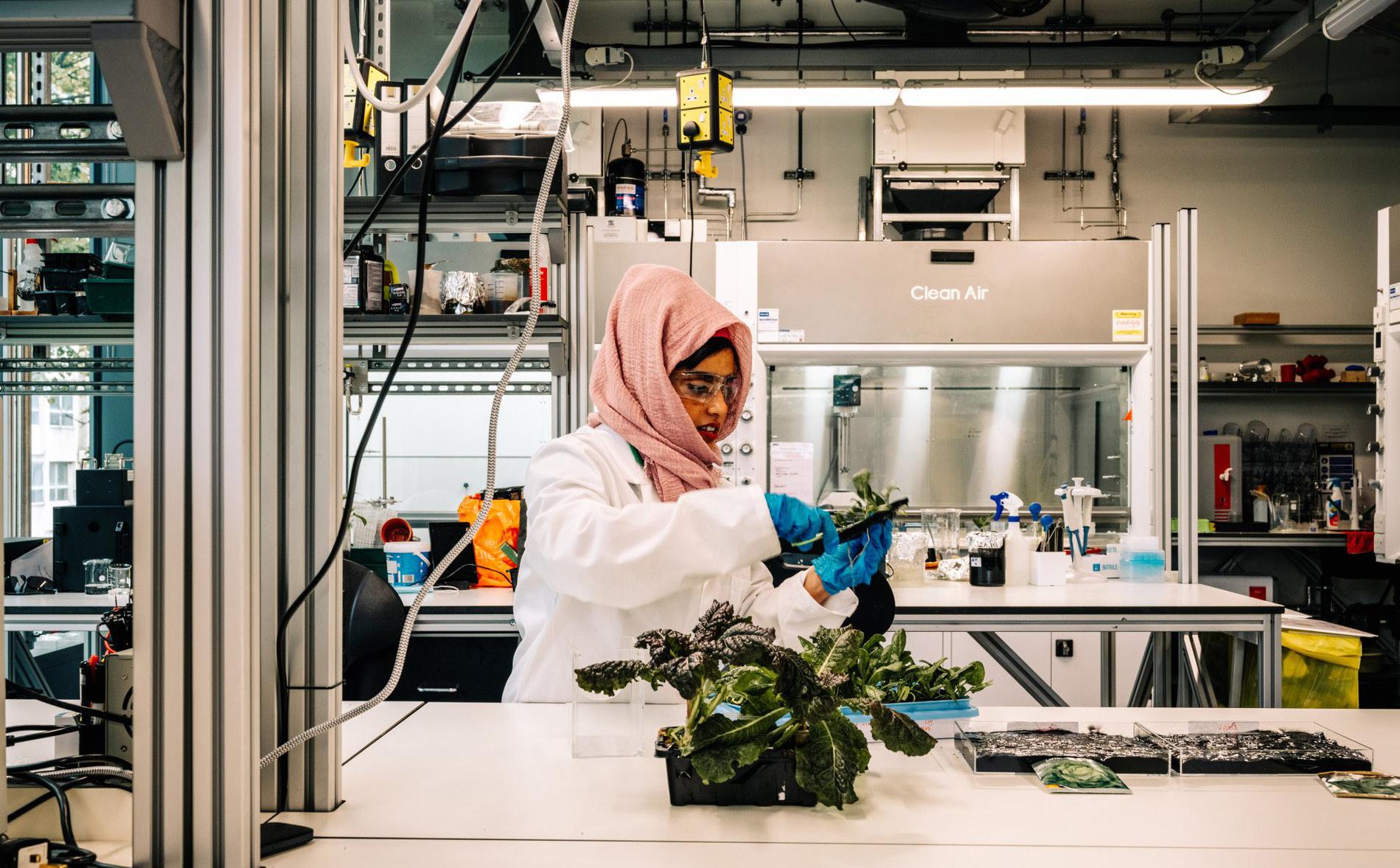
9 minute read
Case Studies
Case Study 1 – AEH Innovative Hydrogel Ltd
An intelligent soil alternative that can sense and respond to a plant’s nutritional needs is being developed by scientists using graphene, the 2D super material first isolated at The University of Manchester.
Advertisement
GelPonic could help address heightened global food security concerns following the coronavirus pandemic, drastically reducing the amount of energy and human interaction required to produce food using ‘vertical farming’ techniques.
While vertical farming aims to minimise water use and maximise productivity by growing crops hydroponically in small amounts of nutrient-rich water stacked in a climate-controlled building, high energy and labour costs mean it is not currently considered a sustainable long-term solution.
The University of Manchester start-up AEH Innovative Hydrogel Ltd has secured £1 million of Government funding through Innovate UK for the two-year Graphene Engineering Innovation Centre project to develop a unique, virtually maintenance-free ‘vertical farming’ system. By using minute electronic sensors to monitor a plant’s nutritional requirements, then automatically release nutrients to its root system, GelPonic has the potential to substantially reduce production costs and labour requirements.
GelPonic relies on a growth substrate – the surface or material from which an organism feeds – for indoor fruit-and-veg that improves performance in numerous ways. The hydrogel growth medium conserves water and filters out pathogens to protect plants from disease, while a graphene sensor allows remote monitoring, reducing labour costs.
Moreover, the production of the growth medium outputs significantly less CO2 compared to traditional solutions and can also be used in areas with drought conditions and infertile soil. Led by Dr Beenish Siddique, AEH Innovative Hydrogel has been supported by the European Research Development Fund’s Bridging the Gap programme and was a 2019 prize-winner in the prestigious Eli and Britt Harari Graphene Enterprise Award, run by the University.
Bridging the Gap was developed to proactively engage with Greater Manchester-based SMEs and new ventures to allow them to overcome challenges, and explore and apply graphene and other advanced materials in a wide range of applications and markets.
The extra £1 million in funding announced by the UK Government is part of a broader £24 million spend to assist UK farming through pioneering technology.
“One of the biggest hurdles in controlled environment agriculture is operational cost, which makes it a lowprofit-margin business,” Dr Siddique explained. “The fact this system is almost maintenance-free could make a big difference to whether farms can be successful or not.
“We believe there is an opportunity here to change the future of farming not just here in the UK but around the world.
“Globally, around 70% of the fresh water available to humans is used for agriculture and 60% of that is wasted; agriculture also contributes around 20% of global greenhousegas emissions. Our system helps control that waste and those emissions, shortens germination times and could enable an increase of 25% in crop yields.”
GelPonic is among the latest innovations to emerge from the Graphene Engineering Innovation Centre (GEIC) in Manchester. The GEIC is part of a £100 million investment in infrastructure to support the development of applications made possible by the isolation of graphene by scientists at The University of Manchester in 2004. Graphene technology is already supporting research into new methods of water filtration, advances in healthcare, aerospace and automotive super lightweighting, and battery power.
Supported with £5 million of funding from Greater Manchester Local Enterprise Partnership and Greater Manchester Combined Authority, the £60 million GEIC specialises in the rapid development and scale up of graphene and other 2D materials applications.
The GEIC sits alongside the £61 million National Graphene Institute and both are part of the vision to create a Graphene City in Manchester, with scientific research conducted in partnership with industry to deliver prototypes then production. The £235m Henry Royce Institute, which has its headquarters in Manchester, will further boost the city-region’s capabilities as the UK national institute for advanced materials research and innovation.
One of Dr Siddique’s colleagues at the GEIC is commercialisation leader Ray Gibbs, whose role is to help to bring innovative ideas to fruition through launching start-up and early-stage companies such as AEH. He believes the pandemic, in tandem with net-zero targets, has sharpened the Government’s focus on investment in innovation.
He said: “The COVID pandemic has demonstrated the fragility of the UK supply chains, none more so than food supply. Indoor farming allows us to grow food in the UK that would normally come from another part of the world. That contributes to selfsustainability, reduces food miles and means we’re not so reliant on international markets for our food.”
AEH is developing its system alongside project partners and subcontractors including Crop Health and Protection (CHAP), Labman Automation, Grobotic Systems and Stockbridge Technology Centre (STC).
CHAP’s Innovation Network Lead Dr Harry Langford said: “There is a significant market demand for more sustainable hydroponic substrates. This project is an exciting opportunity to optimise and scaleup a novel hydrogel product and demonstrate this product directly to the end-user, within a highly innovative automated production system.”

Case Study 2 – ProMake
How 3D printed body parts saved a man’s arm and inspired an incredible business idea

Entrepreneur Jason Laing and his team are building a medical 3D printing business based on his personal success in overcoming horrific injuries. Founded in South Africa, it made sense for ProMake international to capitalise on Greater Manchester’s strengths in health innovation and advanced materials along with the collaborative mind set Manchester has.
Jason Laing knows better than most the benefits of advances in materials science and healthcare innovation. Having suffered horrific lifechanging injuries in a 2015 cycling accident, he became the subject of a personal experiment in the use of 3D printing for medical purposes. Using 3D printing technology, Jason and his team were able to design, manufacture and repair parts of his body, saving his arm from the risk of amputation.
3D printing and virtual reality also helped with his occupational therapy and mental rehabilitation where he re-learned how to walk, talk, read and write all over again due to the head injury he also suffered.
Jason’s journey has been documented through a TED Talk he did not long after his accident after learning to talk properly and memorising his speech.
That experience underpins the work of 3D printing healthcare manufacturing business, ProMake International Ltd, which established headquarters in Manchester in 2019 and is now being rebranded as ProMake LTD.
Through its advanced and unique product design, expertise in composite materials and progressive 3D printing technologies, the company assists inventors in developing and launching innovative products into global markets, particularly in the life science and aerospace industries. Following Jason’s successful recovery, ProMake’s team have fully transitioned their expertise into the medical field by conducting facial reconstruction surgery using 3D printing.
In 2019, they completed the world’s first inner ear transplant surgery to improve hearing by harmonically tuning the 3D printed implant with a patient’s harmonics.
Since then, the ProMake team has also recently discovered that graphene – a 2D material first isolated in Manchester – is proving to be an even better medical solution for reconstructive surgery.
In leading their business from Manchester, they have been able to turn graphene into a functional form for their pioneering work by developing a unique way of 3D printing graphene polymers.
To support this application, Promake has been working - under agreements - with experts from Haydale and the University of Manchester’s Graphene Engineering Innovation Centre (GEIC), which was funded in part by the Greater Manchester Local Enterprise Partnership.

COO and Co-Founder of ProMake Ltd, Jason says that his journey into 3D printing began with his experience as a jeweller, which included research into metallurgy, composite technology and computer-aided design.
That led him to work alongside his business partner Gavin Leggott along with maxillofacial surgeons, orthopaedics and veterinary care, merging that experience to develop innovative new healthcare solutions.
He discovered first-hand how they could work when a ProAm cycling accident left him with multiple injuries, including broken bones, dislocations, collapsed lungs and open fractures where bones broke through his skin.
Faced with the prospect of having an arm amputated, Jason says he worked with the surgical team to find ways that 3D printing might help.
He said: “We really took it to a new level because I also then gave full permission to take my life in my own hands essentially, and take the risk so that we can pioneer new developments that would then be used for medical research further on. So that’s where 3D printing really came to play for me.
“3D printing itself excites me because of the possibilities that it can bring about, and what it has done for me already. “The technology itself has not only given me a career but actually gave me my life back. And it helped me rebuild my own body. So now we are going to be able to take that technology, the research that we did on me as a patient and as a technician, and now be able to give that information back.”
Jason says he is excited about the impact this work can deliver on a social level as well as a corporate level, meaning that patients will benefit too. The move to Manchester means access to research at the cutting edge of advanced materials in a city region renowned for health innovation and where people work well together.
He adds: “3D printing with graphene is a major game-changer. The 3D printing technology has not only rebuilt my own body but now as we also fuse this technology with graphene, we continue to unravel endless possibilities for medical innovation. We have recently introduced the world’s first accessible commercial graphene 3D printing portal.
“Collaborating, experimenting and sharing ideas for greater humanity is at the heart of ProMake’s ethos and that’s why Manchester – alongside it being the home of graphene – is the perfect fit for our innovation mindset. “We want to sit alongside MedTech professionals locally and in all corners of the globe, and by working closely with unique scientific talent at the GEIC and along with our industrial partners such as Haydale within an ecosystem renowned for its long history of international engagement, we feel this is easily within our reach.”
Working with the GEIC - via Bridging the Gap, backed by the European Regional Development Fund (ERDF) - has elevated ProMake’s journey of discovery and they are also now realising the amazing benefits of 3D printing with graphene for external prostheses.
Graphene provides additional strength, superior thermal properties and enhances biocompatibility when added to biopolymers.
It brings other benefits for external prostheses: graphene is cooler, stronger, and enables sensory prosthetic mirroring for symmetry in motion and power release.
Looking ahead, the company has already begun to unearth the possibilities of 4D printing, which would enable them to programme materials to function in a certain way before they print e.g. anti-microbial, sensory, electric and hydro.
The Covid-19 pandemic has demonstrated how rapidly we can evolve under pressure and ProMake is a great example of a business that is grasping this opportunity to challenge the status quo and move with pace to deliver real change for the benefit of all.







